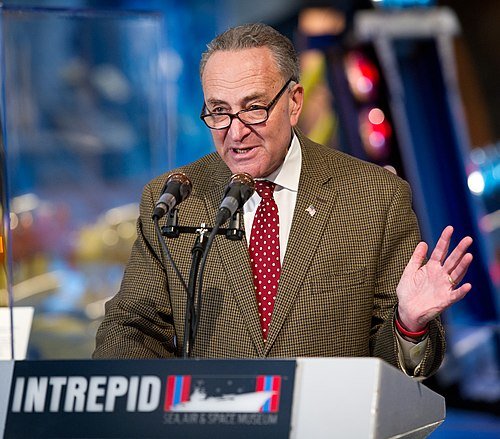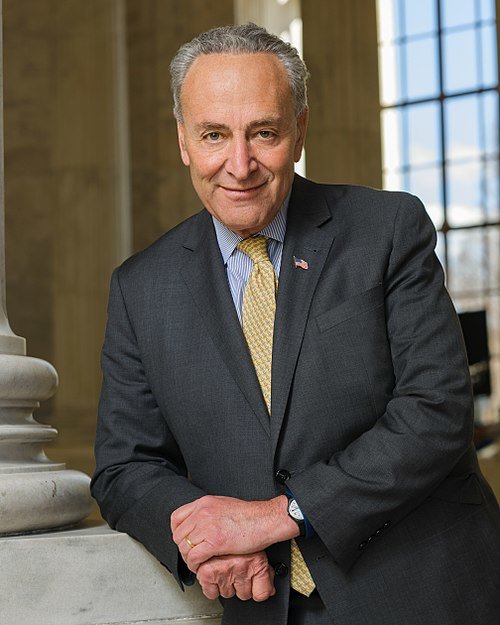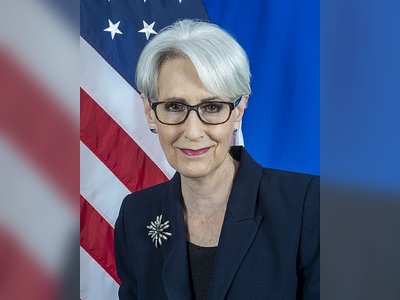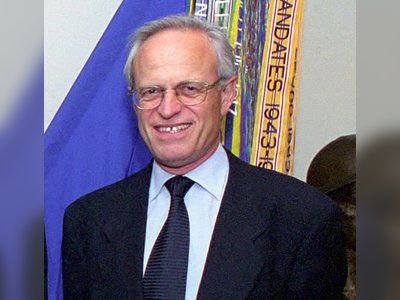Chuck Schumer: A Political Journey
Charles Ellis "Chuck" Schumer (born November 23, 1950) is an American Jewish politician affiliated with the Democratic Party, serving as the Senator from the state of New York since 1999. In November 2016, he was elected as the leader of the Democratic caucus in the Senate, which, until January 2021, was the minority party, and has since been the Senate Majority Leader.
Early Life and Education
Chuck Schumer was born in the neighborhood of Midwood in the Brooklyn borough of New York City to a Jewish family. His parents were Selma Rosen and Abraham Schumer. The Schumer family name is derived from occupations of early ghetto families.
He attended public schools in Brooklyn and graduated as class valedictorian from James Madison High School in 1967. Schumer represented Madison High School on the televised quiz show "It's Academic."
He continued his education at Harvard College, where he developed an interest in politics and was active in the 1968 campaign of Democratic presidential candidate Eugene McCarthy. After completing his undergraduate degree, Schumer went on to attend Harvard Law School, graduating in 1974 with a J.D. He passed the New York State bar exam in 1975 but never practiced law, immediately embarking on his political career.
Early Political Career
In 1974, upon finishing his legal studies at Harvard, Schumer ran for the New York State Assembly and, at the age of 23, became the youngest New York State legislator since Theodore Roosevelt.
In 1980, after three consecutive terms in the State Assembly, Schumer successfully ran for a seat in the United States House of Representatives, representing a district that covered parts of Brooklyn and Queens.
In this district, Democratic support was among the highest in New York State. Schumer was re-elected eight times in various district configurations (District 16, District 10, and ultimately District 9), often without serious competition. In 1997, when Moshe Zvi Pollak left his position in the American Rabbinical Assembly, Chuck Schumer delivered a eulogy for him in Congress.
As the 1998 elections approached, Schumer decided to run for the U.S. Senate to represent the state of New York. He won the Democratic primary with 51% of the vote compared to 21% for Geraldine Ferraro and 19% for Mark Green.
In the general election, he defeated the incumbent Republican Senator Al D'Amato, who had served three terms, with 55% of the vote to 44%. In 2004, he was re-elected with a majority of 71% of the votes. In 2010, Schumer won again in the Senate elections, garnering 66% of the vote. In 2016, he secured his fourth term with 70.6% of the vote.
In March 2015, Senators Harry Reid and Dick Durbin supported Schumer's nomination as the Democratic leader in the Senate, following Reid's retirement in 2017.
Legislative Record
One of Schumer's prominent areas of focus has been gun control legislation. During his time in the U.S. House of Representatives, he led the legislative efforts on some of the most notable gun control bills, including the "Brady Bill" in 1993, which established a waiting period for firearm purchases, and the 1994 Assault Weapons Ban, which placed restrictions on the sale of certain types of firearms such as assault rifles.
The Assault Weapons Ban was part of a larger crime prevention bill and was set to expire after ten years. In 2004, Schumer and his colleagues attempted to extend it, but it was blocked by the Republican majority in both houses of Congress.
Schumer has also been involved in legislative matters related to regulation of video games, banking and consumer protection, counterterrorism, and economic development in the state of New York.
As the Chairman and later Ranking Member of the Senate Judiciary Committee, Schumer played a crucial role in matters related to judicial nominations and appointments. In 2007, his support, along with that of Senator Dianne Feinstein, led to the confirmation of Michael Mukasey as the U.S. Attorney General. Schumer was also instrumental in investigating the dismissal of eight U.S. attorneys by the Bush administration for political reasons and was the first legislator to call for the removal of Attorney General Alberto Gonzales over the issue, which ultimately led to Gonzales's resignation.
Foreign Policy and National Security
In 2002, Schumer voted in favor of the resolution authorizing the use of military force in Iraq, which led to the Iraq War. Even after the war became more complicated, Schumer stood by his vote but criticized the management of the war by the Bush administration. He opposed the "surge" of American troops in Iraq in 2007.
In 2006, Schumer led a bipartisan effort that successfully blocked a deal approved by the Bush administration to transfer control of six major U.S. ports to a company owned by the United Arab Emirates, called "Dubai Ports World." This was due to concerns about the company's dual connections to the United States and Al-Qaeda and its parent company's involvement in an embargo against Israel.
Schumer has been consistently supportive of Israel and its government's policies. He joined in the criticism of Yasser Arafat's failure during the Camp David Summit and defended Ariel Sharon's policies during the peak of the Second Intifada. Schumer also supported the construction of the Israeli West Bank barrier.
He opposed the inclusion of Hamas in the Palestinian elections and consistently advocated for the relocation of the U.S. embassy to Jerusalem. In July 2006, Schumer, along with other Democratic members of Congress, condemned a speech by Iraqi Prime Minister Nouri al-Maliki before both houses of Congress due to anti-Israel remarks made by Maliki shortly before his appearance. Schumer has also called for the early release of Jonathan Pollard.
In September 2015, Schumer was one of four Democratic senators who opposed the Iran Nuclear Deal (along with Ben Cardin, Joe Manchin, and Bob Menendez).
Leading the DSCC
In 2005, Schumer was appointed as Chairman of the Democratic Senatorial Campaign Committee (DSCC), responsible for overseeing the nationwide management of Senate elections on behalf of the Democratic Party. His responsibilities included formulating campaign strategy, coordinating election efforts in different states for Democratic Senate candidates, fundraising, and recruiting candidates for Senate races.
When Schumer took on this role, he announced that he would not run for Governor of New York in 2006, as some had speculated. This decision prevented a contentious primary race between Schumer and then-New York State Attorney General Eliot Spitzer, who was elected Governor of New York.
Under Schumer's leadership, the Democratic Party achieved a major shift in the Senate during the 2006 midterm elections, successfully unseating six Republican Senators.
Following the success of the 2016 elections, Schumer was elected as the Senate Minority Leader, succeeding Harry Reid.
Personal Life
In 1980, Schumer married Iris Weinshall. The couple has two daughters and resides in the Park Slope neighborhood of Brooklyn. Iris Weinshall has held prominent positions in New York City government, including serving as Commissioner of the New York City Department of Transportation, and later as Vice Chancellor for Facilities Planning, Construction, and Management for the City University of New York (CUNY).
Chuck Schumer's political journey has been marked by a focus on a wide range of legislative issues, from gun control to foreign policy, and his influence in the Democratic Party has grown steadily over the years. As of my last knowledge update in September 2021, Schumer was serving as the Senate Majority Leader. However, please note that political positions and circumstances can change, so it's important to verify the most current information regarding his career and activities.
- צ'אק שומרhe.wikipedia.org







